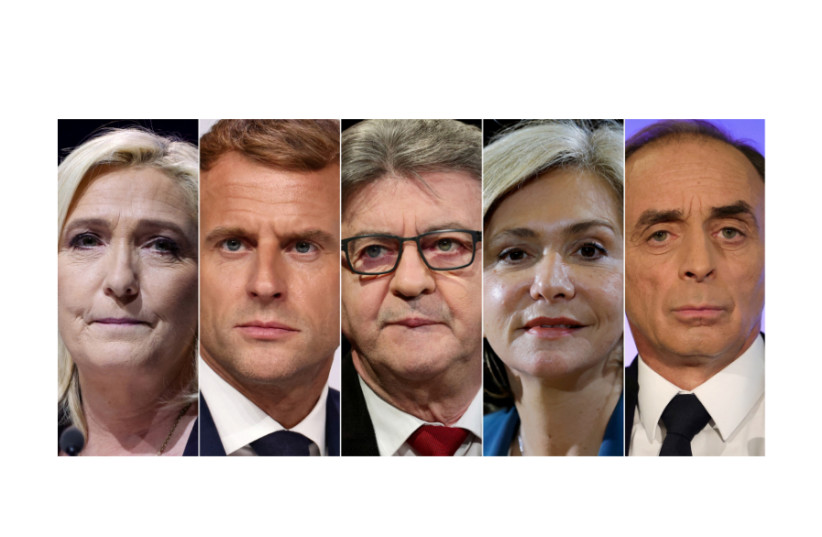PARIS – “I am very sensitive to any manifestation of terror, and I quickly expressed my solidarity with the Israeli people, victims of a wave of terror attacks,” French presidential candidate Marine Le Pen said Wednesday.
This “reminds us French people, unfortunately, the fears that we are all sharing, even though I understand of course that Israel lives with this fear in their stomachs practically daily,” said Le Pen, who is in France’s presidential election run-off on April 24. During a 90-minute news conference in the center of Paris to explain her policies on diplomacy and foreign relations, Le Pen addressed a variety of international issues, devoting a large part of her talk to the Middle East.
“We are fortunate in France not to face such a situation [daily],” she said. “I reiterate my support for the Israelis facing Islamist terror, and say again that terror is a redline.”
Speaking about the Israeli-Palestinian conflict, Le Pen said she embraces the traditional position of France’s Foreign Ministry, namely supporting the two-state solution, with a viable Palestinian state existing in security side by side with Israel, within the 1967 lines, and with Jerusalem as the capital of both states.
“Of course the 1967 line is not carved in stone, if the sides chose to negotiate a different agreement,” she said, noting that unfortunately negotiations are not taking place. Le Pen also said a solution on the issue of Palestinian refugees must be found.

Hailing the rapprochement between Israel and Gulf states, Le Pen said Paris would do what ever it could to help solve the Israeli-Palestinian conflict, noting that France has a special status in the region, being close both to Arab countries and to Israel. She also said France could be more present and engaged, but stopped short of offering to mediate in any way.
These remarks toe the line with statements she made during an interview with The Jerusalem Post about a month ago, where she expressed her support for the two-state solution, but emphasized she believes a solution could be achieved only through direct negotiations between the sides.
The far-right National Assembly leader also spoke extensively about Lebanon, which she said had a special priority for her personally, noting the country was close to her heart.
Still, she said, “Our desire to help stabilize Lebanon does not reduce our commitment to ties with Israel.” A stable and independent Lebanon is a regional interest, Le Pen said, and getting there would require regional consultations with the Lebanese, the US, Russia, Iran, Saudi Arabia, Israel and the Vatican.
Responding to a question on Syria, Le Pen confirmed that she had opposed France’s decision to break ties with the Syrian regime, a position she still embraces.
“It is precisely in critical, complex moments of crisis, and especially when the country was confronted with Islamist terror, that channels of dialogue and communication were needed,” she noted, stating that if elected president, she will work to reestablish bilateral relations with Damascus.
Le Pen’s press conference was interrupted when a protester held up a picture, cut in the shape of heart, showing Le Pen together with Russian President Vladimir Putin during their 2017 meeting. Following the protester’s removal, another activist then started shouting, and he too was quickly escorted out of the building. A few dozen anti-Le Pen protesters – led by anti-racism group SOS Racisme – demonstrated on the sidewalk outside the hall where the news conference was taking place.
Le Pen received 23.15% in the first round of the presidential elections on April 10, while President Emmanuel Macron received 27.84%.
Current polls are putting Le Pen at 48% and Macron at 52% for the April 24 run-off. Macron’s camp fears voters on the far Left will prefer voting for Le Pen, despite the clear call by far-left leader Jean-Luc Mélenchon, who received a very high and unexpected 21.95% of the votes in the first round.
CRIF, the umbrella organization for French Jewry, issued a statement on April 12 calling for everyone to vote for Macron.
“CRIF notes the weakening of the Republican camp and the dangerous strengthening of the populist parties of the extreme Right and extreme Left around the votes for Marine Le Pen, Jean-Luc Mélenchon and Éric Zemmour. The CRIF calls for a republican union to prevent the extreme Right from gaining power.”
